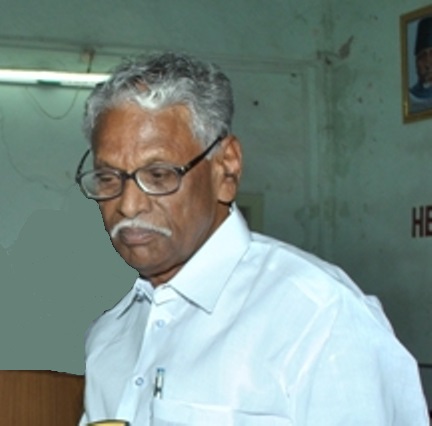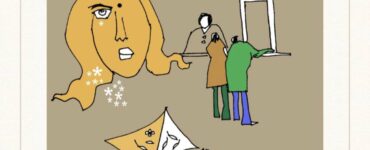| Telugu: Singamaneni Narayana
It is a little over a year since Singamaneni Narayana (1943- 2021) passed away. A school teacher by profession, Narayana wrote short stories, novels and criticism focusing mainly on the plight of the farming community in the drought-prone Rayalaseema region of Andhra Pradesh. He edited Seema Kathalu, a collection of short stories from the region, and a volume of Telugu short stories titled Telugu Katha. He received, among others, the prestigious Katha Nilayam award. *
Ramappa heaved a sigh as if it did not matter to him, looking at the groundnut crop that was dying in the evening twilight. When he looked at the groundnut that had turned dark, flat and dry due to the movva kullu disease[1], he felt uneasy in his stomach. He felt a slight shiver run down his body as scenes of the six sackfuls of seeds he had sown in the twenty acres, the money he had spent on pesticides and on labour, and the loans he had incurred moved in front of his eyes. He sighed helplessly as if all the strength he had garnered all these days had suddenly sapped out. This was the fourth consecutive year—that the groundnut crop had not yielded a good harvest! Three years ago, affected by the erra gongali kaatu [2], the entire crop had turned black as if it had been burnt, resulting in not getting back, not just the money invested on it, but even the wages paid to the labourers. Two years ago, just as it was time for harvesting, there were incessant rains that lasted for fifteen days, resulting in not getting even half of the usual harvest in hand, not getting outan[3] because of inferior quality seeds. The less said about the previous year the better. As soon as the seeds had been sown, the inadequate rainfall soon after completely cheated the farmer. Now they were talking about some strange disease called movva kullu. When his son told him that it was somewhat like AIDS that attacks human beings, he knew things would not be better this time around too! Ramappa came away from the fields and was walking towards the village. As though the earth beneath his feet was holding him back, he was walking, taking one step at a time. His thoughts were stinging him like swarming wasps from a disturbed nest. He was trying to stop and to recall and add up all the loans he had incurred in the last three years! Apart from the loans he had taken from the bank, as different private loans he took at two-rupee to four-rupee interest kept gnawing at his throat, Ramappa was shivering, twisting and turning— Though the total borrowings from Nagaiah for the seeds, manure and pesticides amounted to only forty thousand, when all the interest amounts were added and compounded many times over, it went beyond eighty in the last three years. It was more than two years since Satrala Ramalingaiah had loaned small amounts like a hundred or two hundred several times and had made him sign a bond for ten thousand. He was frightened to think of how much the twenty thousand that he got from Subrahmanyam by mortgaging the ten acre erragarugu[4] soil would have become now. Apart from these the amounts he owed in the town to the cloth store, to the grocery shops, to the manure shops were difficult to account for—people at home did not know about even half of these. ‘How would the crop of which more than 60% had been destroyed pay for my needs and repay any of my debts? Apart from gobbling me up!’ Ramappa said this loudly, quite unaware of saying so. “What bava! You are talking aloud as if you have gone crazy!” When Ramakrishnappa asked him turned around and looked. Ramappa kept staring blankly at Ramakrishnappa who came and stood next to him. “I believe they are distributing Monocrotophos in our mandal. Did you send your son for it?” asked Ramakrishnappa. Shaking his head like someone who had come back to his senses, Ramappa said, “He went the day before yesterday, yesterday and today. Who needs that wretched pesticide after the whole crop is destroyed—even when I was preventing him, the fellow went away saying ‘If not for now, it would at least be useful when we make field beds’.” Ramappa said this as if he was giving an explanation. “On the whole the government has no sense, bava! Even though some scientists have said it’s pointless to use any pesticide for this disease no one has paid any heed—why should they make the farmers go around all the mandals—instead they could have distributed some useful seeds.” Ramakrishnappa began to speak as if he was giving a lecture. ‘This Ramakrishnappa knew the whole world. What to do—poor thing, being educated, not having got a job or any occupation, he was pulling along with the four acres he had tied around his neck like an emaciated bull’—Ramappa reflected in sympathy. “No point in blaming the government, bava! In the beginning the Collector also convinced all the political parties that this pesticide was of no use at this stage. But the very next day all the opposition parties demanded that the pesticide be distributed and made the government agree. All this happened because these parties wanted to prove that they were all on the side of the farmers—it’s they who lured the farmers and made them go round the mandals. This pesticide is neither useful nor something that could be thrown away. Such are the great deeds our people are up to, bava!” Ramakrishnappa went on. “If so, do you think at least today they would have distributed the pesticide, Krishnappa?” Ramappa asked eagerly. “If they don’t give it even now, the farmers will blast their ear drums—let’s go, let’s go, it’s getting dark.” Saying this, Ramakrishnappa walked swiftly. It was quite dark when Ramappa reached home. When he saw his elder son, Nagaraju outside the house, he asked, “Did they give the pesticide at least today?” “Had we not done raasta roko till late last evening—with that a host of officials including the Collector, S. P., and R. D. O., arrived! By the morning the stock of pesticide was there,” he said as if something like a victorious smile danced on his face! “How much did they give us?” the father asked anxiously. “They gave two litres. Even so, how will it be of any use to us now,” said the son. “Anyway, did you at least bring it home?,” asked Ramappa in a hoarse voice. “I have, but I have to give it to Palakonda Subbarayudu tomorrow—I will get four hundred from him. He will use it for his sweet lime grove.” Saying this, Nagaraju walked out. Even after eleven at night Ramappa could not sleep. ‘On the one hand, the debt I had incurred for getting a submersible pump fitted when the well became dry and having the bore dug which went dry in six month’s time is hanging like a sword on my head. On the other hand, the loans made for various other things amounted to more than a lakh and half. These crops would never yield. These debts would never be repaid. Even if these lands were to be sold, nobody would buy them.’ Continuing to think like this, Ramappa got off his bed around midnight. He walked out slowly and went up to the cattle shed close by. Standing on the cattle-groove, he searched all around the loft. Monocrotophos tins were found shining where pesticides were normally kept. Ramappa bent forward, took one of them, held it firmly in his hands and got down. *** (Translation of “Agaadham” from Jeevaphalam-Cheduvisham, 79-82. First published in Kadalika, October 2000.)
|
***
[1] A disease that affects groundnut crop.
[2] Red caterpillar disease that attacks groundnut crop.
[3] Adequate percentage of oil in the groundnuts.
[4] Rain dependent red soil.









Add comment